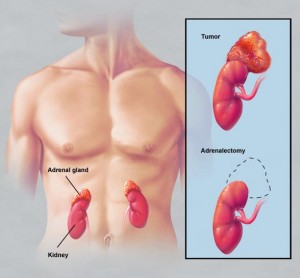Fox Chase physicians are on the cutting edge when it comes to management of adrenal tumors.
At Fox Chase Cancer Center, our multidisciplinary medical team works closely to assess your adrenal tumor and help you understand your options so that you can make an informed decision about your treatment.
Although most adrenal tumors are benign and do not need treatment, not all of them are harmless. Up to 10% of adrenal tumors can produce too much adrenal hormone, which can have ill effects on the rest of the body. Therefore, appropriate evaluation and management of these tumors requires deep and nuanced expertise.
In order to avoid unnecessary surgery, successful management of patients with adrenal tumors requires not only advanced surgical skills, but also a fluent knowledge of adrenal physiology, adrenal neoplasm biology, and adrenal imaging.
Proven Experience in Traditional and Minimally Invasive Adrenal Tumor Surgery
At Fox Chase, our specialists understand the nuances in management of patients with adrenal tumors. In fact, two of our physicians — Alexander Kutikov, MD, FACS and Robert G. Uzzo, MD, FACS — have co-authored the definitive chapter on adrenal disorders in the latest edition of the universally established "bible of urology," the Campbell-Walsh Urology textbook. Additionally, world-class endocrinologic specialists in both benign and malignant adrenal disorders alike are available at Fox Chase.

For patients requiring the removal of the adrenal glands, minimally invasive laparoscopic and robotic surgery are viable options. Using these modern surgical approaches, small keyhole incisions are used to remove the adrenal glands. This minimally invasive approach reduces the need for pain medication, allows a shorter hospital stay and lowers the incidence of complications. These newer techniques such as retroperitoneoscopic laparoscopic and robotic surgery can even be performed on patients with a history of extensive previous abdominal surgery and intestinal scarring.
Our surgical experts are also comfortable with adrenal tissue preservation strategies and open surgical techniques when necessary.
If medical therapy is necessary following surgery, our genitourinary oncologists work along with endocrinologists to provide a team-based approach to care, actively seeking out clinical trials for each patient when possible.
